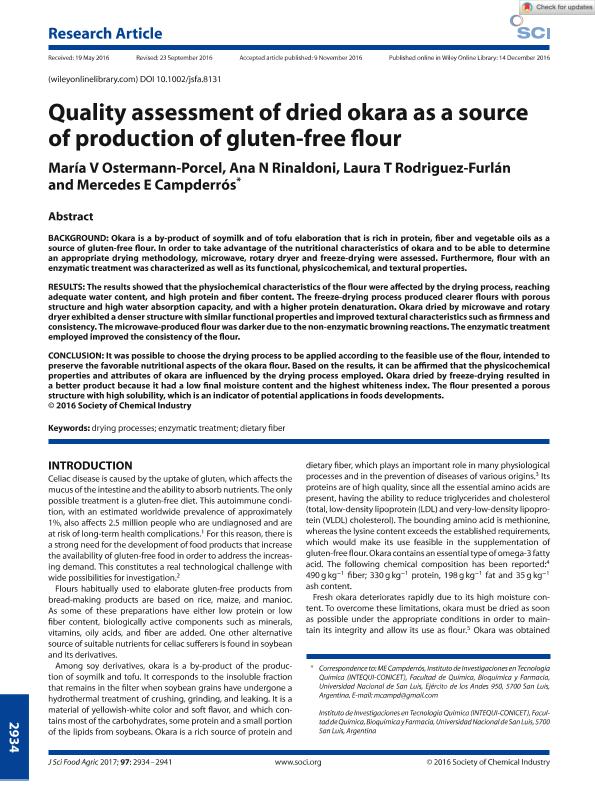Artículo
Quality assessment of dried okara as a source of production of gluten-free flour
Ostermann Porcel, María Victoria ; Rinaldoni, Ana Noelia
; Rinaldoni, Ana Noelia ; Rodriguez Furlán, Laura Teresa
; Rodriguez Furlán, Laura Teresa ; Campderrós, Mercedes Edith
; Campderrós, Mercedes Edith
 ; Rinaldoni, Ana Noelia
; Rinaldoni, Ana Noelia ; Rodriguez Furlán, Laura Teresa
; Rodriguez Furlán, Laura Teresa ; Campderrós, Mercedes Edith
; Campderrós, Mercedes Edith
Fecha de publicación:
07/2017
Editorial:
John Wiley & Sons Ltd
Revista:
Journal of the Science of Food and Agriculture
ISSN:
0022-5142
Idioma:
Inglés
Tipo de recurso:
Artículo publicado
Clasificación temática:
Resumen
BACKGROUND: Okara is a by-product of soymilk and of tofu elaboration that is rich in protein, fiber and vegetable oils as a source of gluten-free flour. In order to take advantage of the nutritional characteristics of okara and to be able to determine an appropriate drying methodology, microwave, rotary dryer and freeze-drying were assessed. Furthermore, flour with an enzymatic treatment was characterized as well as its functional, physicochemical, and textural properties. RESULTS: The results showed that the physiochemical characteristics of the flour were affected by the drying process, reaching adequate water content, and high protein and fiber content. The freeze-drying process produced clearer flours with porous structure and high water absorption capacity, and with a higher protein denaturation. Okara dried by microwave and rotary dryer exhibited a denser structure with similar functional properties and improved textural characteristics such as firmness and consistency. The microwave-produced flour was darker due to the non-enzymatic browning reactions. The enzymatic treatment employed improved the consistency of the flour. CONCLUSION: It was possible to choose the drying process to be applied according to the feasible use of the flour, intended to preserve the favorable nutritional aspects of the okara flour. Based on the results, it can be affirmed that the physicochemical properties and attributes of okara are influenced by the drying process employed. Okara dried by freeze-drying resulted in a better product because it had a low final moisture content and the highest whiteness index. The flour presented a porous structure with high solubility, which is an indicator of potential applications in foods developments. © 2016 Society of Chemical Industry.
Palabras clave:
Dietary Fiber
,
Drying Processes
,
Enzymatic Treatment
Archivos asociados
Licencia
Identificadores
Colecciones
Articulos(INTEQUI)
Articulos de INST. DE INVEST. EN TECNOLOGIA QUIMICA
Articulos de INST. DE INVEST. EN TECNOLOGIA QUIMICA
Citación
Ostermann Porcel, María Victoria; Rinaldoni, Ana Noelia; Rodriguez Furlán, Laura Teresa; Campderrós, Mercedes Edith; Quality assessment of dried okara as a source of production of gluten-free flour; John Wiley & Sons Ltd; Journal of the Science of Food and Agriculture; 97; 9; 7-2017; 2934-2941
Compartir
Altmétricas



